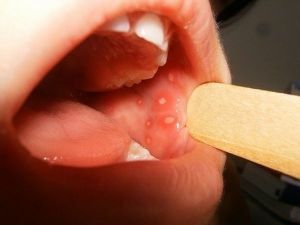 Often the reason for treating patients for dental treatment is a different kind of inflammation of the oral mucosa.
Often the reason for treating patients for dental treatment is a different kind of inflammation of the oral mucosa.
Most often, the inflammatory process in the oral cavity of stomatitis of different origin is provoked.
The causes of stomatitis can be different, different types of the disease also proceed differently, accordingly the treatment plan, like the drugs, is selected by the attending physician individually for each clinical case.
Content
- Varieties
- disease General scheme of therapy
- herpes virus treatment
- Candidiasis mucous
- allergic and aphthous form of the disease
- Universal
medicines set Varieties
disease Depending on the provoking factor are the following types of stomatitis:
- traumatic develops as a result of micro traumas of physical impactor chemicals;
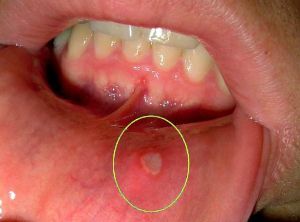
- infectious - candidal, herpetic, bacterial and other are provoked by fungi and bacteria;
- allergic - contact, medication, CHRAS, etc.;
- specific is called the specific disease available in the body( psoriasis, tuberculosis, syphilis), has a typical pattern for these diseases;
- symptomatic develops as a symptom of concomitant lesions - diseases of the blood, gastrointestinal tract, nervous, endocrine systems.
By the way stomatitis is manifested in the mouth, the catarrhal, ulcerative and aphthous forms are distinguished.
They can be different stages of one type of stomatitis, or may appear in isolation.
The general scheme of therapy
The scheme of treatment of stomatitis includes the following directions and corresponding groups of medicines:
- analgesia : preparations based on lidocaine, benzocaine, anestezin;
- combating the cause of : antiseptic, antiviral, antifungal, antibacterial agents;
- removal of inflammation : herbal preparations, NSAIDs, corticosteroids;
- healing : vitamins, rose hips, sea buckthorn, Solcoseryl, methyluracil and its analogues.
For stomatitis for therapeutic purposes, it is practiced to use both local preparations( ointment, gel, spray or cream), and systemic - ingested or parenterally( tablets, injections).
In most cases, dentists try to confine themselves to local means.
The advantages of local drugs are that they:
- have immediate and immediate effects on the lesion;
- does not affect or influence their minimum on the work of internal organs;
- protect the affected area from irritants, thereby reducing soreness and accelerating healing.
At the same time, under certain circumstances, outdoor facilities are not enough. Complex forms of stomatitis, accompanied by intoxication, poor health, high temperature, severe, long-healing ulcers, in combination with reduced immunity of the patient require enhanced therapy with the use of systemic drugs in the form of tablets and injections.
Treatment of the herpes virus
Activated as a result of a decrease in human immunity, the herpes virus on the oral mucosa causes burning, the formation of vesicles, ulcers, fever.
Antiviral and immunomodulating drugs will be an indispensable part of the complex therapy of herpetic stomatitis.
TOP-6 external antiviral agents for the treatment of herpes in the oral cavity:
- Oksolinovaja ointment 0,25% - effective and one of the most accessible local means against a herpetic infection, suitable
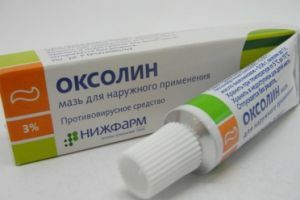 for treatment with stomatitis in both children and adults. The active ingredient is oxoline. To apply it is necessary in 3-4 approaches during the day, applying to the sites affected by the infection. Can be prescribed in childhood.
for treatment with stomatitis in both children and adults. The active ingredient is oxoline. To apply it is necessary in 3-4 approaches during the day, applying to the sites affected by the infection. Can be prescribed in childhood. - Acyclovir - 5% ointment. Effective modern antiviral agent that destroys the internal structure of the virus DNA, thereby preventing its further reproduction and spread. Increases local immunity, has a slight anesthetic effect. It is applied in 4-6 sets per day. Suitable for use from 3 years. Analogues: Acigerpin, Zovirax.
- Bonafton - 0.05% preparation of bromonaphthoquinone. Used more often in ophthalmology, but also a very effective tool that helps with stomatitis. The drug is highly active against herpes viruses, adenoviruses, suitable for children. Apply 3-4 times a day, applying to the affected areas and around them.
- Viru-Merz - 1% gel based on tromantadine. Quickly removes manifestations of herpetic infection - burning, pain and itching, prevents the appearance of new vesicles. Apply the drug no longer than 5 days, 3-5 times a day rubbing into infected areas.
- Tebrofen is an ointment containing 2% tetrabromotetrahydroxydiphenyl. Effective against several types of viruses, has a mild immunostimulating activity. Rubbed in the lesion 4 times a day for 3 to 7 days.
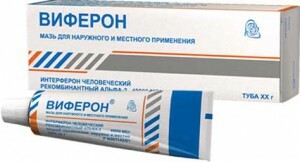
- Viferon is a gel. This drug is an immunomodulator, contains a synthetic protein interferon, similar to human interferon. When applied to the affected foci accelerates local immune responses, increases resistance to the virus. It is prescribed in the framework of ancillary therapy against a viral infection. It is applied 4 times a day for 1 week.
TOP-5 enteral agents that help against the herpetic form of the disease:
- Acyclovir , active ingredient 200 mg. Antiviral action of acyclovir in tablets is effective not only in the treatment of common forms of herpes simplex, but also for the prevention of viral infections. Reception - 4-5 times a day for one tablet. Side effects are rare, acyclovir is well tolerated by adults and children.
- Famevir .Has a pronounced effect against the viruses of simple and herpes zoster, is used to treat acute forms of infection and prevent repeated lesions. For the treatment of stomatitis, 250 mg 3 times a day is dosed, to prevent recurrence, 125 mg twice a day.
- Valtrex - 500 mg, a drug based on valaciclovir. Oppressing the multiplication of DNA-containing viruses, serves to prevent various types of herpes. Reception convenient - 1 tablet twice a day. Children are not appointed.
- Imudon - resorption tablets. Immunostimulating agent, causes a rapid immune response and strengthening of local defense mechanisms in the form of phagocytosis activation, growth of the level of immune proteins and cells in saliva. The composition includes the
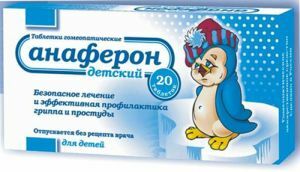 complex of bioactive microbial antibodies. You can take up to 6 capsules per day with a two-hour interval, the course is 10 days.
complex of bioactive microbial antibodies. You can take up to 6 capsules per day with a two-hour interval, the course is 10 days. - Anaferon is an interferon similar to the human. Suitable for the treatment and prevention of various infections, starting at 6 months of age. Well tolerated, does not cause adverse effects. Tablets for resorption during treatment of stomatitis are applied for 1 piece up to 6 times a day. For prevention, you can take 1 tablet a day for up to three months. A similar action has Aflubin, Arbidol.
The combination of "antiviral agent + immunomodulator" quickly suppresses the causative virus and prevents it from spreading.
In addition, anesthetics and healing agents are used, they will be discussed below. Before applying the ointment, rinse the mouth with antiseptic solutions( hydrogen peroxide, Furacilin, Miramistin, Potassium permanganate).In addition to hygienic action, this measure will protect the affected foci from complications in the form of a bacterial infection.
Candidiasis of mucous
Candidiasis requires the use of directed antimycotic agents. Otherwise, the principles of treatment are observed in the same way as for other forms of stomatitis.
TOP-7 ointments from the fungus in the oral cavity:
- Clotrimazole - 1% ointment. Has a wide antifungal activity, quickly suppresses fungal growth in the oral cavity. Ointment can
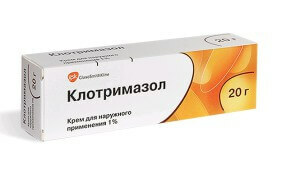 also be used in the bacterial form of stomatitis as a prophylaxis of a local fungal infection. It is applied 3-4 times a day within the affected area.
also be used in the bacterial form of stomatitis as a prophylaxis of a local fungal infection. It is applied 3-4 times a day within the affected area. - Candid is an ointment based on clotrimazole. The spectrum of action and the order of reception is similar.
- Nystatin 5% ointment - with candidiasis of the oral cavity is rarely used, it is usually prescribed with a weak effect from other means. It is applied very gently, with minimal portions within the affected area. Apply twice daily, course from 2 days.
- Pimafucin is a cream containing 2% natamycin. Antifungal drug, has a wide range of applications. When stomatitis is rubbed 1-4 times a day in the areas affected by the milkwoman.
- Miconazole - active against skin fungus 2% ointment. A similar drug is Mikozone. Requires application 2 times a day on the affected mucous membrane.
- Dactarin - 2% oral gel or 0.16% miconazole-based spray, which effectively helps in the treatment of stomatitis.
- Levorin is a drug from the group of antibiotics, which has an antifungal effect. Can be administered in the form of an ointment or granules to prepare a rinse solution.
TOP-4 antifungal agents in tablets:
- Fluconazole capsules 50 mg, has a good effect on various types of fungal infection, taken inside 7-14 days, 1 capsule per day.
- Nizoral is a medicament based on ketoconazole, 200 mg. They are better absorbed when taken during meals, the scheme of use for candidiasis lesions is 1 tablet per day for 2-3 weeks.
- Nystatin is a highly active drug that does not cause resistance in the fungus. When candidiasis of the mouth it is recommended to dissolve 3-4 times a day after meals.
- Diflucan - capsules 50 mg, active substance fluconazole. The dosage is similar to that of Fluconazole.
Allergic and aphthous disease
Allergic stomatitis is the result of individual local hyperergic reactions to various allergens, or systemic autoimmune disorders.
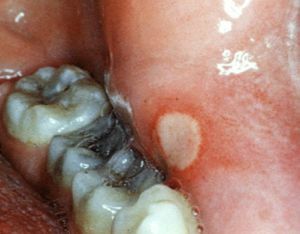 These include and aphthous stomatitis - a chronic disease of an infectious - allergic nature with a recurring course. To the general therapeutic scheme, including analgesia, antiseptic treatment of the oral cavity with various solutions, antihistamines are added, in severe cases, glucocorticosteroid ointments, hormonal preparations in the form of injections( Prednisolone, Dispropan, Hydrocortisone).
These include and aphthous stomatitis - a chronic disease of an infectious - allergic nature with a recurring course. To the general therapeutic scheme, including analgesia, antiseptic treatment of the oral cavity with various solutions, antihistamines are added, in severe cases, glucocorticosteroid ointments, hormonal preparations in the form of injections( Prednisolone, Dispropan, Hydrocortisone).
Top-5 antihistamines in tablets that are effective for allergic form of stomatitis:
- Fenkarol is a drug 10-25 mg based on hifenadine. Refers to antihistamines I
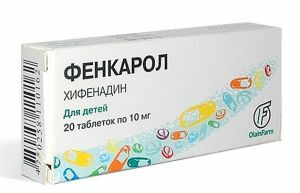 generation. Admission 25-50 mg 3-4 times a day.
generation. Admission 25-50 mg 3-4 times a day. - Tavegil .The main substance is clemastine. One tablet is taken twice a day.
- Suprastin - contains 25 mg of chloropyramine hydrochloride. A proven traditional remedy for various types of allergies. Reception - 3-4 tablets a day.
- Clarotadine - 10 mg of loratadine in tablets. Reception - 1 tablet once a day.
- Cetrin is a medicine, 10 mg of active ingredient. The active substance is cetirizine. Modern antiallergic agent, well tolerated, does not cause drowsiness. Reception - 1 capsule per day.
Local remedies:
- Clobetasol - 0.05% ointment, glucocorticoid drug. It is applied in the areas of allergy 1-2 times a day.
- Dexamethasone - for the preparation of a rinse solution.
- Fluorocinonide - ointment 0.05%.Application 2-4 times a day.
Universal set of medicines
In any form of stomatitis, medications are prescribed to reduce soreness, antiseptic and anti-inflammatory drugs in the form of rinses, ointments, and resorption tablets. The latter are local agents and are convenient for admission.
Pain medication:
- Lidocaine Asept is a combination of lidocaine and chlorhexidine in the form of a spray.
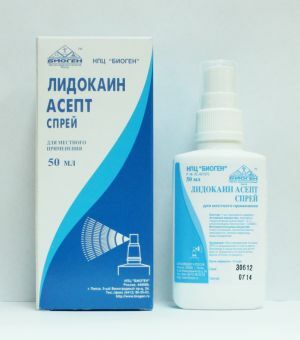
- Kamistad - gel .Exposure - a local anti-inflammatory and antiseptic due to the part of the extract of chamomile, anesthetic component - lidocaine. The gel is applied 3 times a day to the painful areas.
- Instillagel with the content of lidocaine and chlorhexidine. A small amount of gel is evenly applied to the affected area.
- Hexoral Taps - combines antimicrobial and analgesic properties due to the content of benzocaine and chlorhexidine. It is available in the form of capsules for resorption. Take up to 8 tablets per day.
- Teraflu Lar - has a local anesthetic, bactericidal action. The composition includes benzoxonium and lidocaine chlorides. One tablet is taken for resorption every 2-3 hours, the maximum daily amount is 10 capsules.
- Stopangin 2A - combines local anesthetic, antibacterial, anti-inflammatory effects of benzocaine and tirotricin. Assign to children is not allowed. To dissolve 1 tablet every 2-3 hours for up to 5 days.
Anti-inflammatory and antiseptic medicines:
- Pharyngosept - tablets for resorption, are widely used for inflammation of the mucous membranes of the mouth and throat. Oppressively affects pathogenic bacteria. Take up to 5 tablets a day for 5 days.
- Sebidine - tablets for resorption with chlorhexidine and ascorbic acid. It is characterized by antiseptic, bactericidal effect, ascorbic acid improves the processes of tissue regeneration. Use 3-4 tablets within 24 hours.
- Lysobact is an antiseptic drug. The composition includes lysozyme and pyridoxine. The drug is suitable for stomatitis in children from 3 years old, is allowed for pregnant and lactating children.
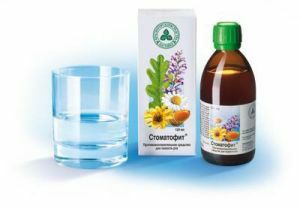
- Stomatophyte - a drug based on herbs, eliminates inflammatory changes in tissues. Water solution is rinsed 3-4 times a day( 1 measuring cup per 1/4 cup of water).
- Miramistin is an antiseptic rinse solution.
- Metrogylanthena is a gel with antibiotic and antiseptic action due to contained metronidazole and chlorhexidine. Can be used from the age of six. Apply 2 times a day on the affected area.
- Holysal .Has a local anesthetic property, fights inflammation. Suitable for children from 1 year of age. The ointment is rubbed into the lesions of the mucous membrane 2-3 times a day after eating, adults in the amount of 1 cm of ointment, children - 0.5 cm.
. Healing preparations:
- Solcoseryl paste , intended for treatment of the oral mucosa with stomatitis. Regenerating, antihypoxic,
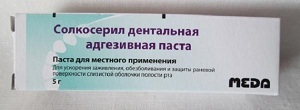 , synthesized from blood serum of calves. It should be used 3-4 times a day after meals. It is not prescribed for children under 18 years.
, synthesized from blood serum of calves. It should be used 3-4 times a day after meals. It is not prescribed for children under 18 years. - Methyluracil 10% ointment is an anti-inflammatory, wound-healing product suitable for children from 3 years of age. Should be used three times a day for half an hour before meals.
- Carotolin - a preparation of vitamin A in the form of an oil mixture, a natural antioxidant, protects the mucosa from irritation and infections. When hypervitaminosis A is prohibited. Affected areas are smeared with Carotolin 1-2 times a day.
- Propolis spray is a natural antiseptic and biostimulant. Contraindicated in hypersensitivity to bee products.
- Olazole is a multicomponent drug with analgesic, antibacterial effect, also promotes tissue regeneration. Apply foam to the surface of the sores 2-3 times a day.
- Sea buckthorn oil, rose hips - active natural substances that contribute to the restoration of damaged tissues. The oil should be applied to the oral mucosa 3-4 times a day.
The drugs on this list are the most popular in the practice of stomatitis therapy. It should be remembered that the intake of any medication should be strictly according to the doctor's prescription after all necessary types of examination.
